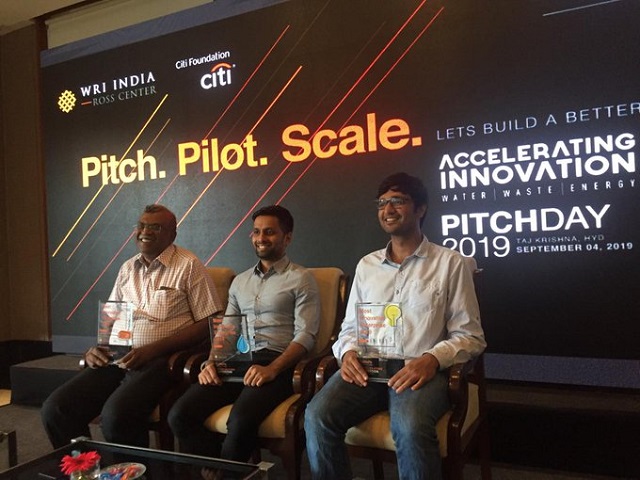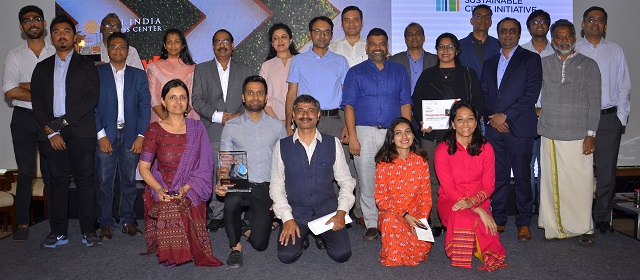
To drive innovative solutions for cities, TheCityFix Labs India connected 10 startups to funders and urban policymakers, before an independent jury chose the three most promising projects. Photo by WRI India
As cities across India contend with rapid outward expansion and growth, critical urban services are lagging behind, impacting long-term environmental sustainability, public health and quality of life. Rapid urbanization and the realities of climate change require the implementation of solutions that are both sustainable and cost-effective. Entrepreneurial innovations can provide significant benefits by helping cities overcome time and resource constraints to tackle climate-related challenges faster and more affordably, enabling more sustainable growth and improved public service delivery.
India’s national government has made a concerted effort in recent years to support the growth of startups, and the country now has the third largest startup ecosystem in the world in terms of number of firms, with Bengaluru behind only London and Silicon Valley. To help channel this entrepreneurial energy to improve urban service delivery, WRI India launched TheCityFix Labs India in October 2018. The aim was to establish a platform to help coordinate investors and the state for public good by helping to connect the innovation ecosystem.
Pitch-Pilot-Scale
From a field of 125 submissions, 10 companies were chosen for their potential to drive progress on water, solid waste and energy management. Solutions were evaluated based on their likelihood to address city needs through disruptive innovation, financial viability, scalability and replicability, as well as their likely social, economic and environmental impacts.
Within the water sector, the three companies selected worked on improving water and wastewater management and efficiency at varying scales. They proposed a smart water meter to measure and manage household water consumption, a wastewater treatment system that can recover potable quality water from sewage treatment plants, and a robot that can conduct pipeline health assessments.
In the solid waste sector, two of the three companies selected for the Labs offered solutions for incorporating informal sector waste pickers into formal systems, providing more income stability and other employment benefits. The third cohort firm catered to India’s growing e-waste market.
In energy, three of the companies selected focused on consumption management, particularly around lighting, heating, ventilation and air-conditioning for commercial real estate. The fourth offered a streamlined method of designing rooftop solar systems.

TheCityFix Labs India project team, cohort and winners at Pitch Day 2019. Photo by WRI India
Each company was given technical assistance by WRI experts to hone their ideas, along with exposure to funders and urban policymakers to evolve their business models. Over the course of eight months, the cohort engaged with 200 city officials, 40 mentors and many technical experts. Through the unique “pitch-pilot-scale” approach, the companies gained visibility at the highest levels, while public stakeholders were able to give feedback about their priorities. This has increased dialogue between public and private actors to allow both sectors to leverage their respective strengths and create a more productive innovation ecosystem.
Bringing Innovation to Practice
The Labs culminated last month with an independent jury choosing three winners from this first cohort of 10 finalists. The jury included representatives from both the Central Government and the State Government of Telangana. Rahul Kapoor represented the Smart Cities Mission under the central Ministry of Housing and Urban Affairs, while Chandrima Sinha represented Invest India, the national investment promotion and facilitation agency. K Vidyadhar, director of Telangana’s Directorate of Town and Country Planning, and Deepthi Ravula, CEO of WE HUB, Telangana’s platform for women entrepreneurs, closed out the jury.
WEGot Utility Solutions received the top award within the water category, with their innovative digital water management platform, VenAqua. Using low-cost, high-precision sensors, VenAqua captures and shares real-time data on daily water usage patterns with clients, reducing water usage by over 50%, all while creating incentives to save more. WEGoT’s product also saves on the electricity required to pump and heat water and lowers maintenance costs by more than 30%. The VenAqua app also notifies users of detected leakages and broken pipes.
Bengaluru-based social enterprise Hasiru Dala Innovations (HDI) was named the most innovative enterprise in solid waste management for their efforts to create better livelihoods for waste pickers, some of India’s most marginalized urban residents. Waste pickers working with HDI receive a fixed monthly income with performance incentives, in addition to the fees they collect and keep for picking up recyclables. HDI then collects fees from clients and takes on full responsibility for transporting the collected waste to the appropriate destination, offering generators of bulk waste a reliable, end-to-end waste management solution.
The winner from the energy sector, The Solar Labs, uses an AI-based software platform to help rooftop solar installers design new systems faster. Compared to a typical solar company’s timeline of three to five days, their software can design a 100-kilowatt system in a matter of hours, a significant factor if India is to reach its ambitious goal of achieving 40 gigawatts of rooftop solar by 2022 (from 4.4 gigawatts today).
All told, the 10 finalists are in discussions with government agencies across the country to carry out nine pilot projects demonstrating their solutions. As a group they leveraged more than $28 million in new private financing. The State Government of Telangana, host to several pilot projects in Hyderabad, signed a memorandum of understanding with one of the companies, Energos, to implement an energy savings solution in its Directorate of Town and Country Planning offices in Hyderabad. Two other companies, Fluid Robotics and Raddiconnect, will also sign pilot agreements with the Telangana Municipal Administration and Urban Development Department in the coming weeks.
TheCityFix Labs India’s impressive first cohort highlights the country’s growing momentum for fresh, innovative and entrepreneurial approaches to urban problem-solving. There is still much work to be done to match these ideas to current and future demand, but by leveraging innovation incubators like the Labs, India can engage cities, entrepreneurs, investors and technical experts in the same civic-minded goals, collectively addressing on-the-ground needs and critical service gaps.
TheCityFix Labs is an initiative of WRI Ross Center for Sustainable Cities, with support from the Citi Foundation, designed to help cities prepare, finance and implement sustainable urban projects.
Aarathi Kumar is a consultant with the Integrated Urban Development program at WRI India and contributor to TheCityFix Labs India.
Jaya Dhindaw is the Director of the Integrated Urban Development program at WRI India and leads TheCityFix Labs India.








